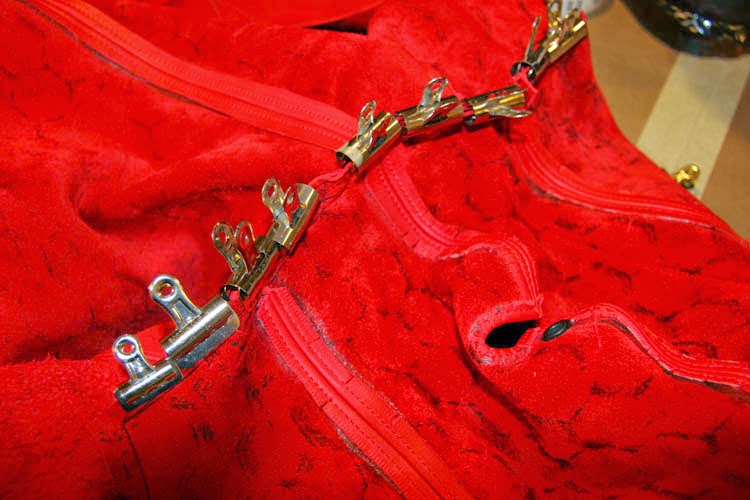Time to finish up the sack. First we need to fine-tune the connection between the hood and the body to get a smooth line. You can see in the image below, the hood seam needs to come in about 1/4 inch to meet the body seam. I usually try to have a little extra here, as it's better to trim down to size than to come up short...
Once the lines are drawn and seam allowances cut, the entire rear opening is glued and turned in along the edge.
From the bottom of the heel pocket:
To the top of the hood:
Glue is applied, allowed to set up, and the whole seam is turned and flattened with a mallet.
Lately I've been sewing in the first half of the zipper without any tape or clips holding it in place. I just cut the zipper a bit oversized, separate it, and sew in the first half freehand.
I also created a zipper stop on this piece, which allows me to have a neater finish (and less bulk) at the beginning and end of the zipper opening.
I cut small rectangles of leather, and skived them down to minimize bulk and create a clean turned edge.
These are sewn to the end of the zipper.
And held in place with double-sided tape.
I don't actually sew these to the zipper until it's partially sewn in. That way I can position it precisely based on what is needed.
For the second side of the zipper, I'm using double-sided tape to hold the it in position.
This allows me to close up the entire second side (kind of a dry-fit), and make sure the leather on both sides of is properly aligned.
Once I'm happy with the placement of the 2nd side of the zipper, I carefully unzip and use binder clips to hold it in place while sewing. The clips provide additional insurance that the zipper won't move out of position while being fed through the sewing machine.
It seems to work pretty well for me so far... Next, long strips are cut for the rear tongue.
The tongue is also held in place with double-sided tape, and topstitched in place.
This sack has two additional sliders, so it can be opened anywhere you like along the rear.
Next up: two internal sleeves with turned and sewn edges.
These are positioned according to the pattern and sewn in place: first from the inside following the line.
And second: topstitched from the outside, using your first line of stitching as a guide.
Instead of backstitching, I just cut the threads long and tied them from the inside. Gives a neater look...
And finally, this sleepsack features nipple access. Circle shapes cut out and placed in just the right location...
These are held in place with double-sided tape, and topstitched. Very, very carefully - it's about as front-and-center as any stitching you'll do. Highly visible.
So, that brings to a close our sleepsack project.
Hopefully I've given some ideas you may use for your own projects.
The ability to make things to your own specifications, and to fine-tune the design to meet your requirements is what custom leather crafting is all about.

























































